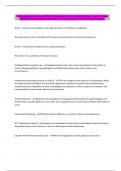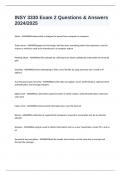PA Psychology Law Exam (PPLE) | Questions & Answers (100 %Score) Latest Updated
2024/2025 Comprehensive Questions A+ Graded Answers | With Expert Solutions
Act 31 - ✔✔Law that mandates continuing education in child abuse recognition.
We need at least 2 hrs as condition of licensure renewal and 3 hrs as prereq for licensure
Act 74 - ✔✔Law that mandates CE in suicide prevention
We need 1 hr as condition of licensure renewal
Privileged Communication Law - ✔✔Supplemented to the rules concerning release of information in
courts, allowing patients of psychologists to withhold information from courts under some
circumstances
Professional Psychology Practice Act (1972) - ✔✔This Act recognizes the practice of psychology to affect
the public safety and welfare, and sets forth regulations to protect the public from unprofessional,
unauthorized and unqualified conduct. Psychologists must possess a valid, unexpired, unrevoked, and
unsuspended licensed issued under this act to practice.
The Rost Decision - ✔✔Reiterates the standards for privileged communications for psychologists, and
clarifies that it usually requires a court order, not a subpoena from an attorney, to release information in
court
Impaired Professionals - ✔✔Defined as active addiction, or mental or physical incompetences.
W/ "substantial evidence," psychologists are mandated to report other psychologists who they know to
be impaired (and not in active tx) or who are diverting controlled substances.
Chapter 49 of the Pennsylvania Code - ✔✔Where all regulations of state agencies are located.
,Code of Ethics (APA v. PA State Board) - ✔✔The Code of Ethics in PA does not overtly contradict the
2017 APA Ethics Code; APA Ethics Code is more specific and concrete.
PA Psychology Code of Ethics (INTRO COMMENTS) - ✔✔Applies Code of Ethics to students and trainees
in psychology
The Board lacks the power to discipline those who are not licensed, it does state that violations of the
ethics code "may be regarded by the Board as evidence of unacceptable moral character".
Principle 2 - representation of nonpsychological academic degrees - ✔✔Applies to psychologists with
terminal masters' degrees or with doctoral degrees in other fields
may represent degree earned if they "specify the discipline in which each particular degree was earned."
e.g Jane, MA licensed psychologist, PHD (public health)
Principle 3 - Application of APA standards and guidelines - ✔✔The standards of the APA apply to all
licensed psychologists in PA.
Principle 4 - Public statements: Group ads; Public announcements; Personal growth groups; accurate
announcements - ✔✔gives more specificity on advertisements than is found in the APA Ethics Code.
Record Keeping Guidelines ($41.57) - ✔✔Retain for 5 years following last professional contact. Abide by
other regs, if longer period is required by State, Federal law, or institutional requirements.
Continuing Education ($41.59) - ✔✔30 contact hours (3 CEUS) per year
Biennium - ✔✔The period of Dec 1 to Nov 30 of odd numbered years
Ethics Principle 1: Responsibility (a-d, objectivity, integrity, data usage) - ✔✔a. objectivity and integrity
of work
, b. research topics and methods, analysis and reporting
c. clarify expectations about use of data, maintain objectivity, and best practices in data collection
d. prevent distortion or suppression of findings
Ethics Principle 1: Responsibility (e-h, broad sense of liability, professional obligations, and guardian
against misuse) - ✔✔e. as members of gov and other orgs, psychologists remain accountable to highest
standards of field
f. as owners, psychologists retain full professional liability
g. as teachers, psychologists recognize primary obligation to help others acquire knowledge and skill
h. as practitioners, bear social responsibility, remain alert to misuse of their influence on others
Ethics Principle 1: Responsibility (I, computerized assessments) - ✔✔i. as professionals using
computerized assessments, or computer-generated data, psychologist is:
1. legally and ethically responsible for psychological assessment, generation and use of data as service to
public
2. responsible for results
3. results provided to non-psychologist according to current standards of noncomputerized
assessments.
Ethics Principle 2: Competence (a, standards and limitations) - ✔✔a. the maintenance of high standards
of professional competence is responsibility shared by psychologists in the interest of the public and
profession; recognize boundaries of competence and limitations of techniques. Provide services only for
which they are qualified. Take all precautions to protect welfare of clients. Maintain knowledge of
current info on services rendered.
Ethics Principle 2: Competence (b, c, qualifications, policing) - ✔✔b. discourages the practice of
psychology by unqualified persons and assists public in identifying psychologists competent to give
dependable service; attempt to rectify competence issues in others informally, then formally thru Board.
c. psychologists are licensed by the Board, following qualified supervision, and licensing exams.
Ethics Principle 2: Competence (d, self-representation) - ✔✔d. psychologists accurately represent their
competence, education, training, and experience. Educational qualifications are obtained from





